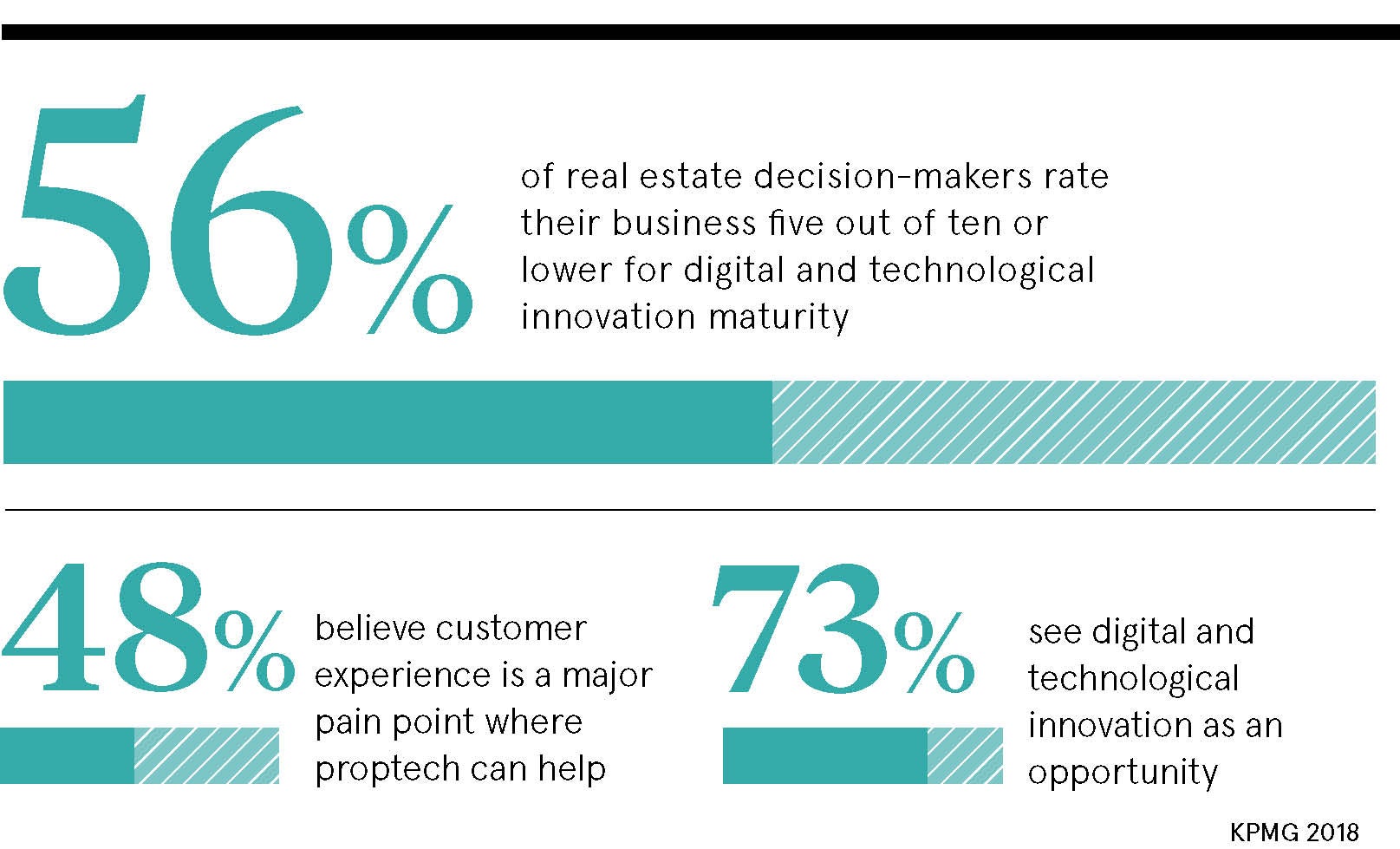Asked “what is proptech?”, punters could be forgiven for thinking it some shiny new smartphone phenomenon, all gizmos and gadgets. They would be wrong: it is actually all about them.
For a start, proptech already has pedigree. Residential behemoths Rightmove and Zoopla were pioneering progress ten years ago.
Nor is technology the whole story. It is plainly important to proptech – the clue is in the name – but there is more to market transformation than the miniaturisation of hardware and proliferation of sensors. Machine-learning and cloud computing are enabling, not defining.
For all the hype, proptech is often undersold, argues Alex Edds, director of innovation, at JLL UK. “On the face of it, proptech is the digitalisation of real estate, but beneath the surface there is so much more to it than that. At its core, proptech addresses fundamental questions of how we experience and extract value from real estate,” he says.
Whereas value extraction has seen an influx of venture capital and private equity into the sector, the focus on experience has opened the door to customer expectations.
Mr Edds says: “Proptech is a reflection of the realisation that the consumer experience needs to be at the very heart of real estate. Where the end-user was once forgotten when it came to decision-making, proptech is turning this on its head. Proptech is shifting the balance of power in real estate.”
Data is a gamechanger
Not surprisingly, residential was an early adopter of proptech, as simple searching and shopping functions started to open up online property portfolios to prospective buyers and renters.
Fast forward to 2019 and a “walk through” is now on the wish list, making augmented reality (AR) almost a must-have investment for developers, according to Helen Barlow, sales and marketing director at SevenCapital. “AR is particularly beneficial for off-plan developments, where a potential buyer needs to ‘view’ the property to feel confident in what they’re planning to purchase, before it’s actually built,” she says.
Also fast on to the original proptech scene was management and engagement app Mallcomm, now accessed by more than 250,000 users in 250 locations, across Europe and America.
In the digital age of the internet of things, consumers expect a lot more from their experience of the physical world, says Mallcomm chief executive and founder Michelle Buxton.
“The connected consumer wants to control their experience of real estate: how they park, how they access the building, control the temperature, lighting, air conditioning and utilities, how they are rewarded for purchase and get tailored offers, book services and pay rent, plus source community news and information. They now expect it all at their fingertips,” she says.
According to Ms Buxton, data is the game-changer, not just as collected from consumer insights, but integrated with market, retailer, building and occupier data. As a result, the modern property mantra is no longer “location, location, location”, she contends, but “location, experience, analytics”.
Sector growth opportunities are even attracting the attention of government, flexing its own digital muscle in support. Calling for a “digital revolution in the property sector”, UK housing minister Esther McVey announced plans to release data held by local bodies to help UK proptech thrive.
The challenge for the property sector, however, is to mobilise its technology strategy quickly enough to manage change, warns Ms Buxton. “Compared to other sectors, real estate is a dinosaur when it comes to evolution, but disruption has the sector in its grips and there is genuine panic,” she says.

Smart homes and social good
The impact of technology on real estate, however, takes many forms, with proptech a potential force for environmental and social good, tackling climate risk and public health.
So-called active buildings, for instance, integrate renewable technologies for efficiency, with digital dashboards that monitor energy conversion, storage and usage, to provide property managers and homeowners greater control.
The sustainability benefits are multiple, says Professor Dave Worsley, director of the Active Building Centre. “Proptech in active buildings empowers homeowners and tenants through creating energy self-sufficient structures. Further benefits to society include addressing fuel-poverty concerns, improving air quality through reduced emissions and encouraging adoption of electric vehicles.”
In Yorkshire, Leeds City Council and the City of York are jointly harnessing the help of proptech to boost the health and welfare of local housing tenants. Backed by Innovate UK, the scheme seeks to improve living standards and air quality, by monitoring humidity and detecting damp in homes.
Proptech is proving a boon for beleaguered property agents, under pressure to comply with fast-evolving legislation on crime prevention and security. Strict identity checks, for example, help combat money laundering and fraud, says Rhys David, chief executive of Credas, an identity verification tool that uses facial recognition to confirm buyers and renters are who they say they are.
“The regulator is very active in issuing new regulations, but equally active in enforcing them via fines and penalties. We are likely to seea lot of regtech-proptech crossover in the coming years, to provide solutions to the changing legal landscape,” he says.
From analogue to digital
Ultimately, proptech represents part of property’s grand digital transformation, which calls for the sector to embrace skills training and culture change, as much as technology shift and evolving consumer demands.
Forward is the only way, concludes James Dearsley, co-founder of global property and proptech platform for business Unissu. “No other industry that has gone through a digital transformation has ever gone back,” he says. “Just like the music and automobile industries, real estate is changing forever.”
The future is written, the future is digital. “We’re witnessing the digitalisation of a largely analogue industry and the opportunities it presents are massive. Continued growth is inevitable. This is not a fad or speculation of future growth. Proptech is here and here to stay,” Mr Edds concludes.
Data is a gamechanger

